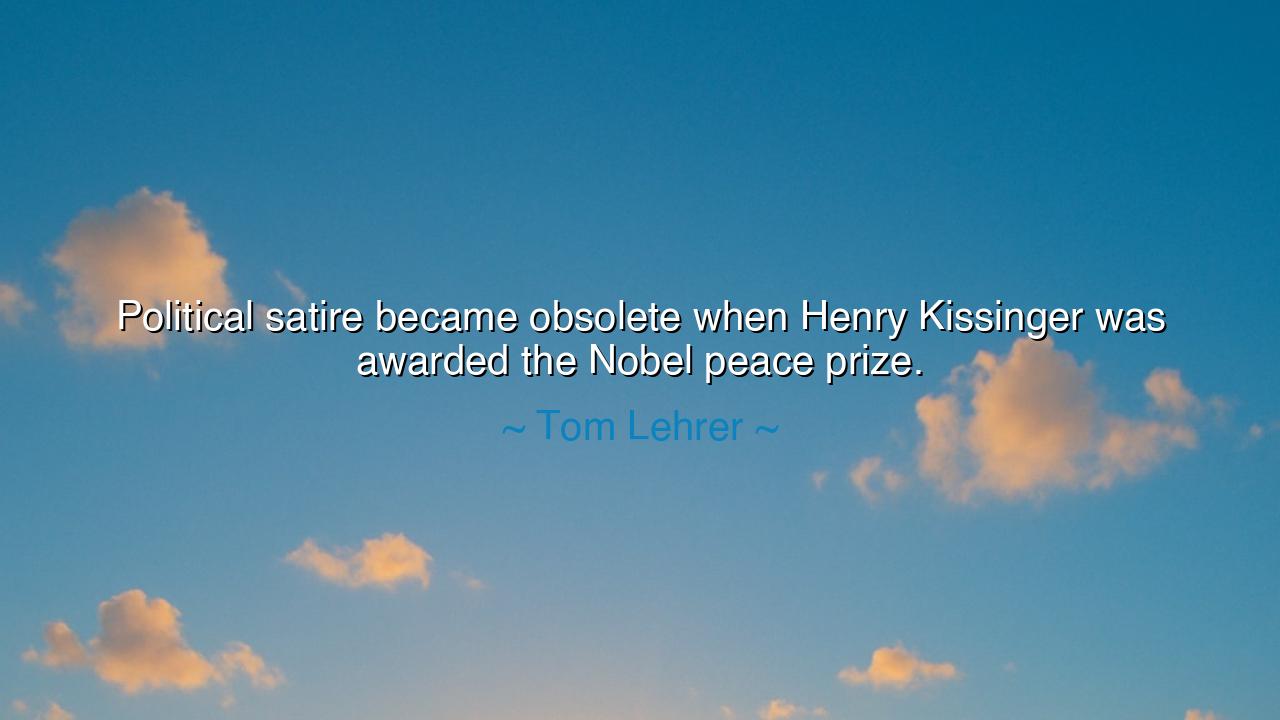
Political satire became obsolete when Henry Kissinger was
Political satire became obsolete when Henry Kissinger was awarded the Nobel peace prize.






Hear the words of Tom Lehrer, master of wit and sharp observer of human folly, who once declared: “Political satire became obsolete when Henry Kissinger was awarded the Nobel Peace Prize.” With these words, he struck a chord of irony so deep that it echoes across generations. For satire, which mocks power by exaggerating its contradictions, is silenced when reality itself becomes more absurd than any jest. To grant the highest honor of peace to a man deeply entwined in war and diplomacy—this, to Lehrer, was irony perfected, leaving the satirist without weapons, for truth itself had become the sharpest joke.
The meaning of this saying rests in the paradox of politics. The Nobel Peace Prize was created to honor those who diminished conflict, who sought to bind wounds and heal nations. Yet in 1973, when Henry Kissinger received it for his role in negotiating a ceasefire in the Vietnam War, many saw hypocrisy rather than hope. For even as treaties were signed, the war raged on, blood still spilled, and the peace proved fragile. To honor such work, Lehrer implied, was to render satire powerless—because the absurdity was complete.
The origin of the quote lies in the climate of its time. The Vietnam War had torn the soul of America, dividing generations, shaking trust in government, and leaving countless lives broken. Kissinger, as U.S. Secretary of State, was both praised as a strategist and condemned as an architect of prolonging conflict. When he was lifted up as a laureate of peace, those who had lost loved ones or faith in the war effort saw only bitter irony. Lehrer, with the tongue of the satirist, merely voiced what many already felt: that the world had mocked itself.
History offers other examples of such paradox. Consider the Roman Emperor Nero, who proclaimed himself a lover of the arts and patron of beauty, even as Rome burned under his reign. Citizens whispered bitter jokes, for what satire could exaggerate a ruler who fiddled while his city turned to ash? In such times, jest becomes redundant, because the deeds of the powerful mock themselves. So too with Lehrer’s remark: satire falls silent when reality surpasses farce.
O seekers, reflect on this lesson: irony is not born of jest but of truth twisted. When the world crowns as peacemaker the very figure associated with conflict, we are reminded of the fragile nature of human judgment. Honors may be bestowed, titles granted, yet the substance of true peace is measured not in ceremonies, but in the lives restored, the wounds healed, and the divisions reconciled. Without this, awards ring hollow, and satire has no need to invent what is already absurd.
Yet do not despair. For even in such contradictions, there lies a warning: do not be deceived by the surface of honors and proclamations. Seek instead the deeper truth, judge not by titles but by deeds. As the ancients said, “By their fruits you shall know them.” If peace is true, it will be seen in the flourishing of the people, not in the praises of committees.
The lesson, then, is clear: do not place blind faith in the laurels of the powerful. Question, discern, and measure actions by their true outcomes. In your own life, do not mistake appearances for substance. Let your deeds, not your proclamations, be the measure of your honor. And when the world seems absurd beyond satire, let it stir in you not only laughter but vigilance, to ensure that truth and justice are not drowned by irony.
So let Lehrer’s words endure as both jest and warning: “Political satire became obsolete when Henry Kissinger was awarded the Nobel Peace Prize.” For when power mocks itself, the people must grow wise, lest they too become actors in a theater where tragedy masquerades as comedy, and peace is spoken of but never lived.






HPLe Tran Ha Phuong
Tom Lehrer’s quote is a sharp critique, and it makes me wonder—how much can we trust institutions like the Nobel Peace Prize when they seem to reward actions that are counter to peace? Does this disillusion us to the point where satire and humor can no longer be effective, or do they become even more important in pointing out the inconsistencies and flaws of those in power?
TLTrinh Lyusagi
I get Lehrer’s frustration with the Kissinger Nobel Peace Prize, but I’m left wondering—has political satire really become obsolete, or is it just evolving? Is it possible that satire has grown more complex in a world where contradictions like this are everywhere? In a time when political realities are so bizarre, do we need a new form of satire to keep up with the absurdities of today’s political landscape?
Llinh
Lehrer’s sarcastic take on Kissinger winning the Nobel Peace Prize highlights how satire can lose its edge when the real world presents such extreme contradictions. But does this mean satire has become irrelevant, or does it simply reflect the increasing absurdity in politics? How do we continue to use satire as a tool for social critique when the real world often feels just as surreal as the jokes themselves?
TLPham Thuy Linh
Tom Lehrer’s quote about political satire becoming obsolete after Henry Kissinger won the Nobel Peace Prize really makes you question the credibility of the award. How can someone associated with such controversial actions be awarded the Peace Prize? It’s almost as if the absurdity of the situation undermines the seriousness of the prize itself. Can political satire still function when the line between absurdity and reality becomes so blurry?